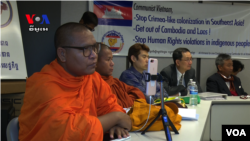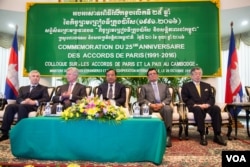Cambodians at home and abroad commemorated 25 years since the signing of the Paris Peace Accords earlier this week, expressing concerns that the pledges made were not fully implemented decades later.
In Arlington, VA, Cambodian-American community leaders gathered to mark the anniversary of the official end of the civil war.
Yem Rithipol, president of the Our Mutual National Interests group, told the conference, which was held at George Mason University, that Cambodians had hoped the agreement “would help us have independence, integrity, [and] sovereignty” but “all kinds of freedom have not been realized.”
The United Nations Transitional Authority in Cambodia (UNTAC) was created as part of the agreements and tasked with disarming all factions, repatriating 35,000 refugees, and organizing a national election in 1993.
“The Paris Peace Agreements have been violated by the Vietnamese and pro-Vietnamese regime of Hun Sen,” said Dy Kareth, vice president of the Cambodian Borders Committee. “They’ve violated territorial integrity, democratic principles, freedom of all the people.”
Prime Minister Hun Sen has been in power for more than 30 years and has been accused of using the military and judicial system to subdue his opponents.
“There seems to be stable now, but this is only superficial. Deep down it’s like boiling water. There could be instability in the future,” said Yap Kimtung, president of Cambodian Americans for Human Rights and Democracy.
Other participants raised concerns that the political situation could further deteriorate ahead of the next general election in 2018.
“What really concerns me now is that the ruling party doesn’t seem to have [the] will to organize a fair election,” Kimtung said. “This really worries me because Cambodia would not have true democracy.”
Prom Saonora, a Cambodian-American who has been lobbying the U.S. Congress to take action against Hun Sen’s regime, said holding a “free and fair” election and respect for human rights could be achieved by creating a “Cambodia contact group” of countries, including the United States and Japan, which would monitor the elections.
However, veteran journalist Nate Thayer said recent calls to reconvene the Paris conference were unrealistic, adding that Cambodians should not blame foreign powers for their homegrown problems.
“You talk about selling off your country? And the Vietnamese invading and taking over parts of Cambodia? That is not the Vietnamese,” Thayer said. “That is Cambodians, who are lining their personal pockets because they have access to political power, guns, and money.”
“And they use it to sell off the country to foreign interests. That is what is happening with the Chinese, that is what is happening with the Vietnamese, and, frankly, that is what is happening with whoever can come in and get a piece of the pie.
“That is not Hun Sen's fault. That is the fault of all the Cambodian leaders in the last generation,” he added. “The Paris Peace Agreements were a failure.”
However, Chum Bunrong, Cambodia’s ambassador to the United States, said the agreement had been well implemented. “There’s nothing bad or unsatisfactory. [It’s] only the opposition and those who want to benefit from it who find it not good.”
In Cambodia, government officials agreed, with Foreign Minister Prak Sokhon saying the accords were “a roadmap, a program that we need to implement step by step because of our constrained situation.”
An advisor to Sokhon said the accords no longer have any legal bearing and attempts to request intervention from signatory countries would be “interference” that would be in breach of the agreement.
Claude Martin, a former French ambassador, told VOA in a recent interview that the implementation of the agreements was flawed from the beginning.
Meanwhile, the opposition held its own event at its headquarters in Phnom Penh, where its deputy leader, Kem Sokha, said, “The rule of law should apply to everyone regardless of the status or political party.”
Mu Sochua, Cambodia National Rescue Party lawmaker for Battambang, pointed to the killing of political and land rights activists, environmentalists and union leaders as examples of “the lack of implementation of democratic principles of democracy and the rule of law.”






